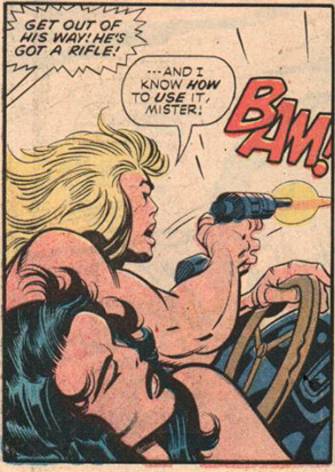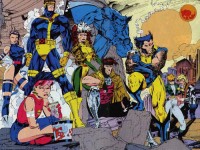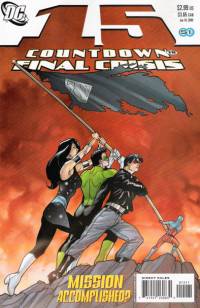
January 2, 2009
 CR Holiday Interview #10: Abhay Khosla
CR Holiday Interview #10: Abhay Khosla


*****
I enjoy
Abhay Khosla's take on comic books so much that for a time I was popping onto message boards he frequents just for the chance to to read what was on his mind. I imagine his writing is aggravating to some, as it utilizes a self-absorbed, stream-of-consciousness style that makes frequent leaps between pop culture references and focuses on text and reviewer in equal measure. I very much like it. His essays for Brian Hibbs'
The Savage Critic(s) are some of the best in comics, print or on-line, and are the best thing going on a site that includes comic book review heavy-hitters
Graeme McMillan,
Jog and
Douglas Wolk. What distinguishes Khosla's essays beyond their idiosyncratic voice is the quality of his insight, the attentive reading of the work at the foundation of each review, and a sort of non-fussy fearlessness that his writing evinces I think as a result of being so powerfully its own thing. I was sort of stunned Khosla agreed to do a short interview, as I believe he mistrusts a lot of the typical comics community interactions. I'm glad he did, though, and after reading the following I think you will be, too. -- Tom Spurgeon
*****
TOM SPURGEON: I swear I won't ask you too many personal questions, but am I right in thinking that you started to review comics as a student? What led you to start reviewing comics?
ABHAY KHOSLA: Poor social skills? Emotional retardation? Syphilitic dementia? I don't... Is this really the kind of depressing note you want to start this interview on? What kind of sick game are you playing at, Comics Reporter?
"I got a heathen to cry during the holidays. You're welcome, Baby Jesus."

When I was a senior in high school, my school opened a time capsule of letters my class had written to ourselves when we were freshmen, that they'd saved for us. And my letter, 3/4ths of it was the usual stuff about friends, family, girls, but the last paragraph was a lengthy, handwritten, carefully worded, dead-serious prediction of what would happen next in the
Chris Claremont-
Jim Lee Uncanny X-Men. Of course, by senior year, Jim Lee had moved onto the
WildC.A.T.S (Covert Action Teams), so really, it was heartbreaking in more than one way.
So, I don't know how to answer this one honestly. Sure, I'm a guy on the internet with an unhealthy relationship with comic books --
how original! But who cares? I always skip these parts of interviews. I don't care who
Sal Buscema took to the prom. Heck, I question the necessity of this entire interview. People don't tune into this blog to hear me blather on. They tune into this blog to read about the brutal repression of Iranian cartoonists, or to hear what
Bart Beaty thinks about
L'Association, whatever that is. I wouldn't know what a L'Association was if the Iranians brutally repressed one onto my face. This interview is going to be a disaster.
SPURGEON: You employ a very sprawling, reference-laden, confessional and frequently humorous style in your reviews. I know this may sound stupid but why that style? Is that just the way you write, the way to write you find most pleasurable, maybe? Is it a useful style? I remember a transition you make in your review of Air
#1 to talk about color and it occurred to me that your style really facilitates that kind of serial association.
KHOSLA: I went back and looked at
your interview with Tim Hodler last year, the intro to it:
"He doesn't rant, or even vent. What he does is carefully analyze each book in a way where it seems as if he's come to every comic he talks about with wide-open eyes and a complete lack of agenda or obvious bias." That made me laugh because
Holy Crap, am I the opposite of that. I'm all axes-to-grind, irrational biases, unexplained neuroses, hair-triggers, bizarre hissy-fits. I know that makes some blog-o-readers (?) want to avert their eyes, but I find unpacking those dysfunctions, I don't know, just kind of funny, so...
Wallah: clown show.
It would be dishonest to pretend that I have a rational relationship with comics. I've been reading them since the third grade. My relationship with them isn't mathematically sound.
I just start writing and hope I have fun, hope I make myself laugh, hope I make connections.
Alan Moore said something
in a Salon review once:
"intelligence does not depend on the amount of neurons we have in our brains, it depends on the amount of connections they can make between them." Chuck Klosterman had a line:
"In and of itself, nothing really matters. What matters is that nothing is ever 'in and of itself.'" Or of course, best of all, there's the late
David Foster Wallace's commencement speech at Kenyon College, how "the freedom" of an education" is that
"you get to consciously decide what has meaning and what doesn't." So, I try to stay mindful of how with any comic book, however insignificant it might be "aesthetically," there's still so much to discuss; if nothing else, every single comic book is an artifact of the culture that created it.
Comic creators -- sure, there are a few hacks, but most of them are trying their best. Which is really tragic, considering the results, but -- but look: they put their thoughts, feelings, biographies, into those books; they try to be original. That's not a reason to go easy on them, but it's at least a reason to try to put some elbow-grease into it, to try to look beyond the surface details of plot. Or I was walking by a lingerie store earlier this week, and I noticed a "female" mannequin with unusually large breasts. Like,
Anita Ekberg breasts. What was it like for the sculptor of that mannequin? Was that a good day at work where he gave it his all --
"Oh good, today I get to watch Andy Sidaris movies for inspiration" -- or was that a bad day at work where he half-assed it --
"Oh god, today I have to watch Andy Sidaris movies for inspiration"? The answer is I'll never know because I haven't walked in his shoes, and I don't know what his job is like, and it really, really depends which Andy Sidaris movie you watch because they're
not all the same, they're not all
Savage Beach. So, I think there's a metaphor there, and that metaphor explains why I spent a half-hour staring obsessively at a mannequin's fiberglass tits, my breath fogging the window.
I fail. All the time. But I guess I have my own personal set of goals.
I guess an argument could be made that as a member of a "model minority" group that places an emphasis on conformity and achievement, my interest in comics (where the "professionals" so often aren't) and my over-emphasis on vulgar humor is all dimestore rebellion. But I just don't think about that sort of thing when I sit down to write about
the Mighty Thor. When I write about the Mighty Thor, I think
"If I were engaged in foreplay with the Mighty Thor, would I pull his hair and then tease his nipples with one of his helmet-feathers, or the other way around?" But that argument could be made, I suppose. By some kind of asshole.
SPURGEON: I was surprised that you committed to writing for Savage Critic(s)
at a point at which I thought you weren't going to take on something like that again. What attracted you to writing for Brian's site? Are you particularly fond of or sympathetic towards any of the other writers? How closely do you pay attention to the feedback you receive there?
KHOSLA: I guess I was flattered to have my name associated with Jog and Douglas Wolk. Wolk can be entertaining
writing about 52, and then turn around and write about
Chris Ware just as sharply; great eye for talent, too. I really enjoyed the
Tomb of Dracula chapter of
his book; I loved that there was a
Tomb of Dracula chapter, you know? Jog always makes the things he finds in books seem like they were obvious, like they were sitting there waiting for him.
His Jademan Wong piece in particular was tremendous;
his review of Josh Simmons's House was a favorite. He almost
persuaded me to like the new issue of Final Crisis, even. Both guys can just -- they just can
explain shit, you know? I don't think I can do that much at all.
Plus, I liked the site before I started writing for it. I always liked how the site was direct, concise, to-the-point. I guess I ended that. I'd never really written proper "reviews" before so... I guess I wanted to see if I could add something unique to that game. I don't know how it's gone so far. Some lousy pieces, some okay pieces. So-so.
But sure, I had zero interest in writing anything before that e-mail. You think it might be unhealthy, writing criticism? There's been study after study lately how the happiest people are the ones who don't over-think things, the ones who can "get out of their heads." There was an article in
The New Yorker entitled "
The Very Bad Review" about the meanest review ever written in history,
John Churton Collins's 1886 review of an
Edmond Gosse book. The socially popular Gosse ended up living a happy life supported by his celebrity friends in the literary world, none of whom cared that he was a hack; the socially unpopular Collins ended up socially ostracized, ultimately killing himself. What's often called for is surrender, but perhaps the critical impulse can often be antithetical to surrender...? I'm not sure. But I guess I'm a little ambivalent about the whole enterprise, to be honest. So far, it's been okay.
I read all of the feedback. I usually try not to interfere. People got angry at me when I first started, just... for even existing, but that's died down, those people figured out how to avoid me. That part was so much fun, though. That might have been the best part so far.
SPURGEON: You float a notion in one of your Secret Invasion
reviews that you wanted to write about that series in part because of its event status and maybe the enthusiasm that fans seem to feel for that kind of thing would rub off on you in some way. I don't know how serious you were, but is that true? Do you read things differently now?
 KHOSLA:
KHOSLA: I didn't want to write about
Secret Invasion because I thought I could create a
"ha, ha, look how terrible this is" series of essays. That it became that is regrettable. I saw a lot of "critics" and fans online complain about
Civil War, which I thought was a crackerjack series. I didn't feel like the specific virtues I saw in
Civil War were being articulated while that series was running. There's so many reasons to hate multi-title crossovers, that it's difficult to look beyond that and ask why they work, why the audience responds to them favorably. So, I was hoping to get to present a "defense" of the mainstream with
Secret Invasion. While still being realistic that
Secret Invasion wasn't, you know, "important to comics" or whatever, without being one of those
Newsarama reviews that make you wonder if the reviewer has ever read, like, an actual book, one without pictures.
None of that worked out. Maybe it wasn't a realistic goal to begin with, given my nature.
There's a critique of mainstream comic fans that can be made, but the word I don't see get thrown around a lot is "envy." Superhero fans always seem like they're having a great time. With art comics, the conversations that I tend to see, it's not as much about actually caring about what happens to the characters who live in the four-corners of the page. It's more about whether "so-and-so is a genius" or not, aesthetic questions I have no interest in, the cult of creators. I've never seen anyone go nuts on the internet over what happened to Crying Asian Man from some Adrian Tomine comic.
"I'm going to predict what happens to Crying Asian Man in the next issue of Optic Nerve." Never seen that. I've never seen a Crying Asian Man fan-site, or anyone dressed as Crying Asian Man at a comic convention, or Crying Asian Man slash-fic.
A review can't effect the sales of something like
Secret Invasion, so I know some people question the point of those reviews. But to me, it's so much fun writing about something people care about so passionately. Part of the fun of those books is that people want to argue about them, that they invite a certain kind of arguing.

I find myself increasingly confused by the contempt people have for mainstream comic fans. There are a few occasions when it's been justified -- the fan reaction to decisions in the Siegel copyright case, say -- but there are also times where it seems as though those fans just get taken for granted. DC published
a series called Countdown, where DC sold their fans 52 issues of a series under the completely false pretenses that reading that series would somehow increase their appreciation of the
Final Crisis crossover. And the
Countdown series didn't do that apparently -- DC failed to keep that promise, which to my mind is unmistakably indefensible. It's an act of naked contempt. But I kept seeing people online turn that around and make the argument that it was the fan's fault for... even caring, that fans were being too continuity-minded, that fans had been foolish for even having wanted
Countdown to begin with. That they'd somehow got
posted 12:00 am PST |
Permalink
Daily Blog Archives
November 2019
October 2019
September 2019
August 2019
July 2019
Full Archives


